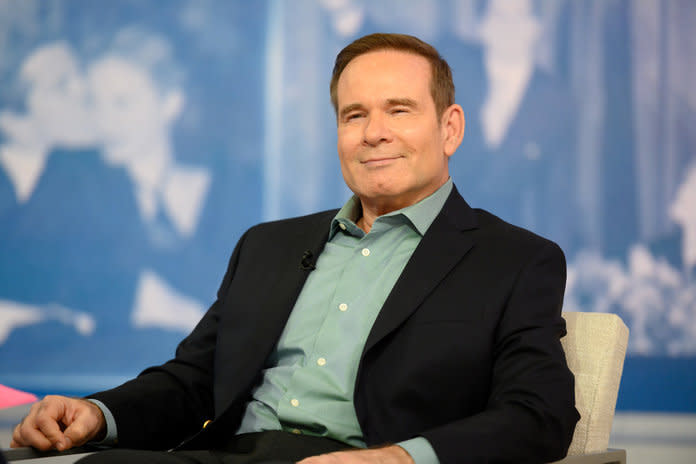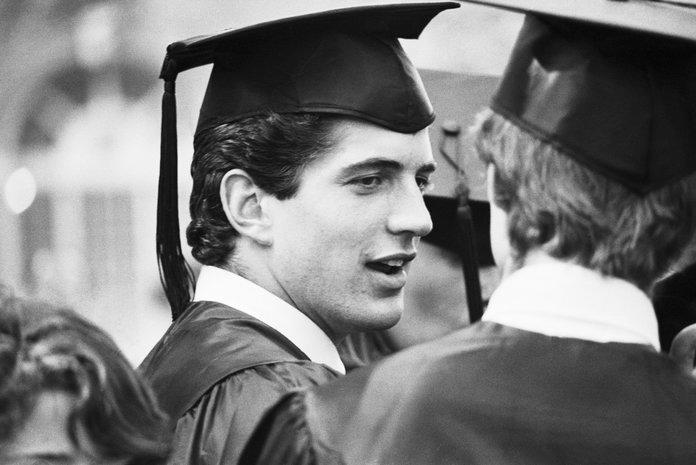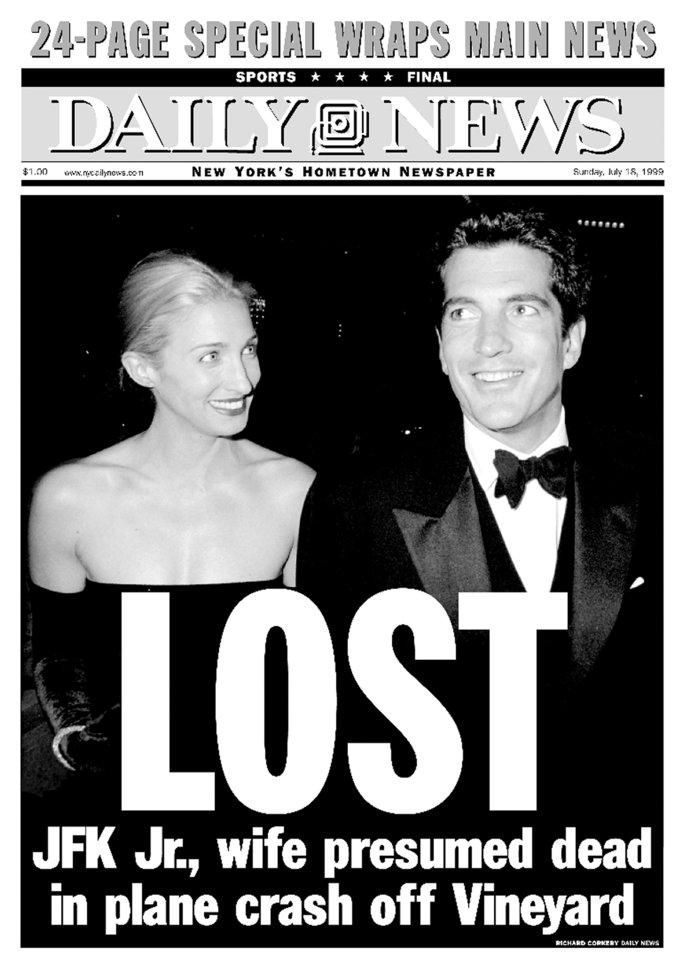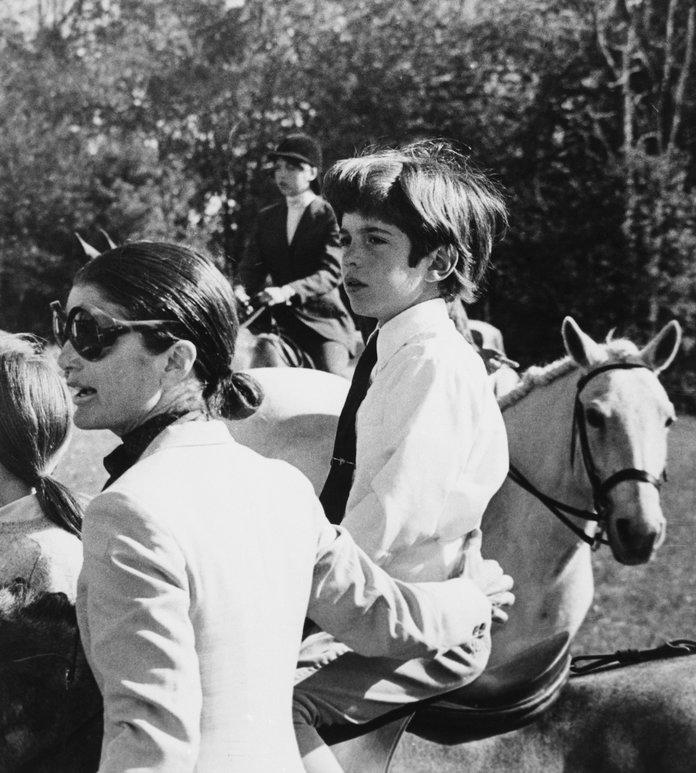JFK Jr.'s Friend and Biographer Says Jackie Kennedy Was a “Helicopter Mom”
Twenty years ago, the nation was struck by an unthinkable tragedy: Heir to “Camelot” John F. Kennedy Jr., his beautiful wife Carolyn Bessette, and her sister Lauren were all killed after their plane, piloted by Kennedy, went down over the Atlantic during their short trip to Martha’s Vineyard.
Two decades later, Steven M. Gillon, a friend of the late Kennedy and a historian and biographer in his own right, is rewriting the script when it comes to John’s legacy and untimely death. His new book, America’s Reluctant Prince: The Life of John F. Kennedy Jr., melds exclusive interviews, extensive research, and personal anecdotes to build a comprehensive vision of Kennedy’s 38 years.

“It means more to me than any other book I've written,” Gillon tells InStyle of America’s Reluctant Prince, his 13th book. “I wanted to get it right because John deserved for me to get it right. I had a lot of emotional investment.”
In a story that feels stranger than fiction, Gillon met Kennedy in 1981 as a teaching assistant at Brown University in a course about 20th century American political history. Gillon was expected to give a presentation about John F. Kennedy in class — and on this day, of all days, the late U.S. President’s son sat in the first row of the lecture hall, mere feet from the already nervous Gillon. Understandably panicked, the then-25-year-old abandoned his carefully rehearsed opening line, instead uttering the first sentence that came to mind: “President Kennedy had no moral scruples.”
Luckily, the class read Gillon’s introduction as a joke, lightening the mood enough to allow him to continue on with his lecture and find approval from the subject’s college-aged son.

RELATED: John F. Kennedy Jr. Used to Avoid the Paparazzi by Dressing Up Like a Woman
Gillon explains in the book’s opening pages that while he and John played a role in each other’s lives for nearly two decades, they were by no means best friends. “I understood my place in John’s life was that of the racquetball-playing ‘professor,’” he writes. “When not battling each other on the racquetball court, John and I shared long conversations about politics, current events, and his father’s place in history. He would occasionally share personal stories about his family and about the challenges of growing up the son of a martyred president."
In 1997 Gillon told Kennedy that though he’d been appeared on the History Channel several times over the years, he really wanted to break into hosting, but was having difficulty convincing the right people that he was suited for the job. Without any notice, Kennedy called the History Channel offices and volunteered to appear on the network for a special on the 80th anniversary of his father’s birth — but only if Gillon hosted the segment. Of course, this was a huge career coup for Gillon and led to the creation of his own show, HistoryCenter, which continued on for the next nine years.
It’s anecdotes like these, as heartfelt as they are objective, that give America’s Reluctant Prince its unique depth and Kennedy himself a new appeal to his public.
RELATED: JFK Jr. and Daryl Hannah's Relationship Reached a Breaking Point Because of Her Dog
Pursuing this project also forced Gillon to confront sad truths about his friend. “I was surprised about how difficult the last year of his life was,” he said. In fact, this “final year,” in particular, is the topic of a new A&E documentary based on Gillon’s book: JFK Jr. — The Final Year.
“I spent time with him and I knew about [his cousin Anthony Radziwill, who was dying from cancer], I knew what was going on in the magazine, I got a glimpse of what was going on in his relationship with Carolyn but I had no idea of the depth of the problems that he was confronting,” Gillon admitted. “He never showed it, you would never know, he was just as upbeat and funny and outgoing and full of life as he had been in other times. I feel bad because I wish I had known, I could have just said something to him or invited him to talk about it, but I didn't realize how much he was suffering.”

Unlike most of his subjects, Gillon hadn’t initially viewed Kennedy through a historical lens. “When I got to know John I wanted him to tell me who he was, so I knew very little, I knew John as a friend, I knew the intricacies of his personality but I didn't know where he went to high school because we didn't talk about it."
He went on, "I just never read anything about him, so I learned a lot in the course of the research that I did not know when I met him, and I hadn't fully appreciated the trauma of his childhood. One of the things I tried to explain in the book, to myself more than anything else, was why John was so restless and why he was so reckless. That was something I learned that I feel, at least for myself, I found a satisfying explanation for why he was that way.”

As personal as the topic was to Gillon, he ultimately remained objective in putting the book together. “I put it all on the table,” he says. “There's not a single thing where I'm like ‘you know I don't want to write this because it will embarrass John.’ Nothing. As I was going through the process of writing this book these memories were coming back, things that we did, things that he said, and I managed to work almost all of them into the book, and I did not censor myself in any way in order to protect John.”
In fact, his critique of most of the books written about Kennedy (of which he claims to have read all but those released this year), is that “they held back and were reluctant to talk about things which I think need to be discussed.”
“I am critical of John at certain junctures and about George and the way he handled some things with George,” he continues. “I think he could have done more to help Carolyn deal with the paparazzi and the media, but I didn't come across anything that I found especially damning about him that would have been scandalous, and if I had I would have written about it.”
RELATED: Why Sarah Jessica Parker Called Dating John Kennedy Jr. "The Kennedy Fiasco"
Another thing that sets Gillon’s book apart from the rest is his access. He sat down for extensive interviews with many members of Kennedy’s inner circle, including John’s George chief of staff RoseMarie Terenzio (who was instrumental in convincing Gillon to write America’s Reluctant Prince in the first place), the wife of John's cousin and best friend, Carole Radziwill, and John’s George business partner Michael Berman.
“There were people that chose not to cooperate, but no one gave me a hard time or told me not to write the book,” Gillon explained. “Up until I wrote this book I was silent and did not participate in any projects about John, so I respect that decision.”
A&E’s documentary, which premieres on July 16, features particularly stirring footage of Kennedy squabbling with a photographer on the beach, his voice strained in anguish as he begs the paparazzo to leave him and his girlfriend be. It’s difficult to watch, but it also begs the question, is this the life John would have chosen for himself?
According to Gillon, yes, it was. “John liked attention,” he tells us. “His mom was that way too, they demanded privacy, but if John wasn't in the media for a couple weeks, if he went a month without being on Page Six, he would go out and play a game of football in the park and you could bet he'd have his shirt off. John would not have wanted to just fade away ... He grew up being in the focus of media attention and I think he was kind of addicted to it.”

“I think it became difficult for him after he got married and he saw how Carolyn was struggling with all the media attention, and that's when he becomes defensive, and that's when you see he has these outbursts that you don't normally see with John,” he explained.
Carolyn grew particularly wary of the press following Princess Diana’s death in 1997. “She obsessively watched every minute of television coverage, wondering if she would meet a similar fate,” Gillon writes.
RELATED: A Broken Promise to Jackie Kennedy Was Responsible for JFK Jr.’s Untimely Death
Though Bessette and Kennedy’s deaths were not products of the media, the tragedy did breed its own brand of conspiracy. John and Carolyn were soon lumped into the rising victim-count of the so-called “Kennedy Curse.”

“It's just bogus, there's no Kennedy Curse,” Gillon says of the long-running notion. “You know the Kennedy's are risk takers. President Kennedy insisted on an open limousine when he is going through Dallas even though the Secret Service recommended otherwise. Bobby Kennedy had no Secret Service protection and waded into crowds. And John was reckless. I drove in cars with John. I've been in cars while he's sped down 5th Avenue weaving in and out of traffic. They took risks and they suffered the consequences of people who take risks. There's no Kennedy Curse.”
Though matriarch Jackie Kennedy never used such terms, she was quoted as expressing fear for her children following Bobby Kennedy’s assassination (“If they’re killing Kennedys, then my children are targets”). This would explain her lifelong protectiveness toward John Jr.

“She was a helicopter mom before there was such a term,” Gillon explains. “She guided him, she could be tough with him. The one thing that she impressed upon John was that he had to lead a meaningful life ... She knew what John was like, absent minded, so she would arrange for people to contact John — so John was always getting these internships, especially when he was in law school. He used to think they just fell on his lap but in fact his mom was arranging all these things behind the scenes. She was calling on her large collection of other powerful people and had them intervene to help guide John through various stages of his life.”

RELATED: Jackie Kennedy's Skincare Routine Was Surprisingly Simple
But despite the obvious privilege that came with being born into one of the country’s most prominent families, those who knew John stress how unaffected he was by the fame and status he bore.
“He never left anybody behind. No matter how famous he always responded, he always took the time to help someone,” RoseMarie Terenzio said in a panel following a screening of JFK Jr. — The Final Year. “He had an investment in other people’s success, and he always had his hand out to help anyone, no matter who they were, no matter how long ago they knew him."

Penguin Random House
“The generosity of spirit is one of the things that really sets John apart,” Gillon said during the same panel discussion. “John could have lived like a king, but he lived in many ways like the rest of us — he took the subway, he rode his bike, he didn’t ask for special privileges, and I think in a time when there are people who are in important positions that have a very different approach to life, it boils down to humility. I think John had humility about him, and it shows that no matter how rich you are, or how famous you are, you’re really no better than anybody else.”
